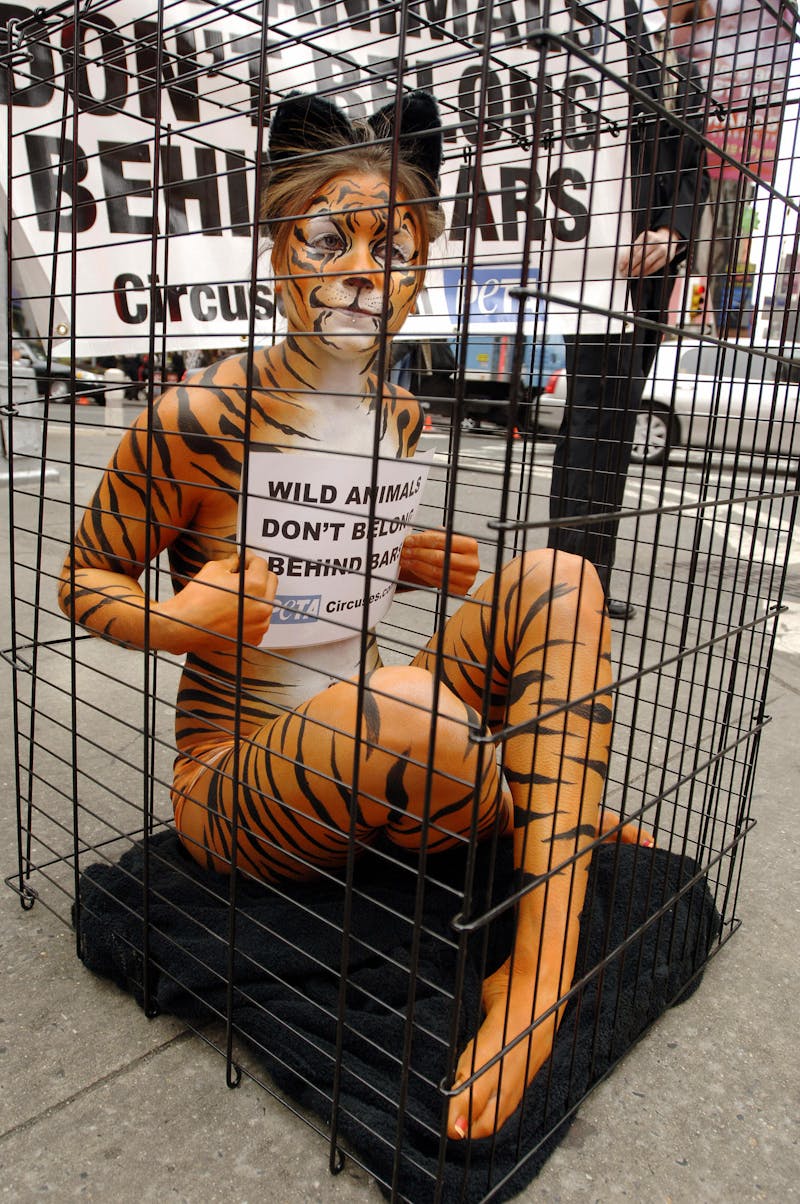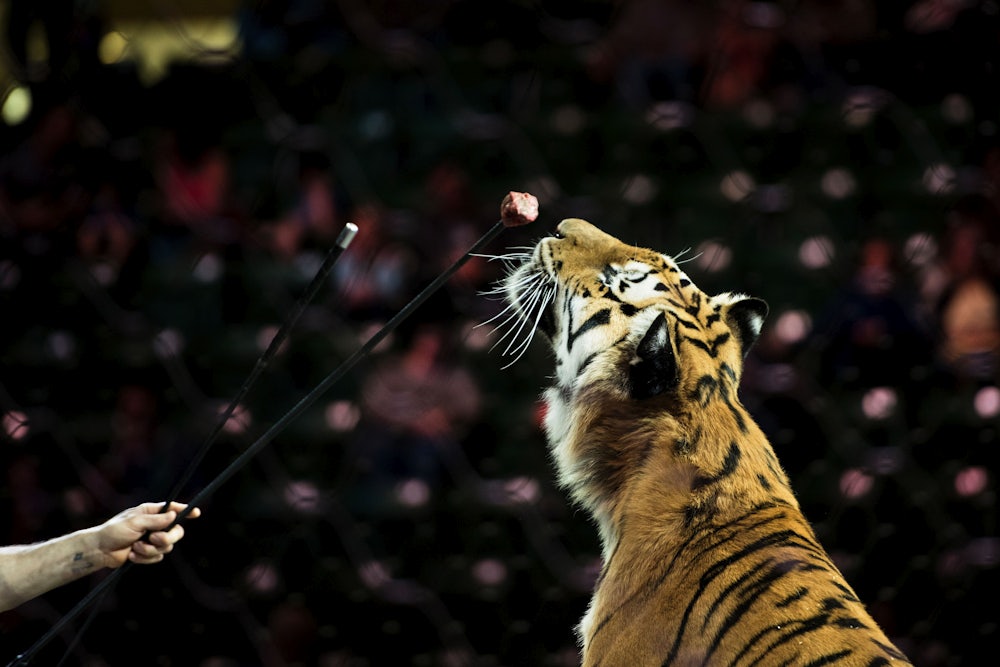In 1990, the Ringling Bros. and Barnum & Bailey Circus came to Daly City, California, for a series of shows at the Cow Palace. On opening night, circus-goers were greeted outside the arena by animal rights activists who handed out leaflets accusing Ringling of abusing its exotic stars. Later, during an intermission of the show, three activists dressed as clowns chained themselves to a high-wire support rope on the main stage and shouted slogans. “Circus workers used bolt cutters to snip the protesters’ chains,” according to a report at the time. “The clowns were taken to the San Mateo county jail and booked on suspicion of trespassing, disturbing the peace and conspiracy.”
Ringling Bros. has been hounded by such activists for at least the last three decades of the its 146-year history. While the Cow Palace protesters came from In Defense of Animals and Berkeley Students for Animal Liberation, the circus has been a top target of powerful animal-rights organizations like PETA and the Animal Legal Defense Fund. These groups all shared a single goal: to shut down Ringling. “These animals have suffered so much to make Ringling money,” said Delcianna Winders, vice president of the PETA Foundation. “Our hope has always been that these animals would be rescued.”
They got their wish in January, when the circus announced that it was folding up its tent for good. The circus had already retired its elephants a few months beforehand, but its total shutdown appeared to mean retirement for the circus’s big cats, too—specifically, eight tigers, six lions, and one leopard. As activists saw it, this meant the cats would not longer endure bright lights, roaring crowds, inhumane living conditions, and the obligation to perform. In other words: a new life for the eight endangered tigers, of which there are only 3,200 left in the world, and for the lions and leopard, which are listed as threatened species. “It felt like after this long struggle, we had finally achieved our objective,” said Anthony Eliseuson, an attorney for the Animal Legal Defense Fund.
Not quite. Last month, Ringling’s parent company, Feld Entertainment, filed an application with the U.S. Fish and Wildlife Service (FWS), asking for a permit to export all 15 cats to a German circus. The application kicked off a furious debate: More than 100,000 comments have been posted on the Federal Register website, most begging the FWS not to grant the permit. “Please let them live out the rest of their lives in peace,” read one. “Abusing and misusing animals for entertainment is unconscionable,” read another.
While many objectors are merely concerned about the fate of the eight captive-born tigers, this debate is about a much bigger concern: the commodification of endangered species in America. Why would government allow the export of endangered animals in the U.S. to companies overseas? Isn’t that exactly what the Endangered Species Act is supposed to prevent? The above commenters won’t like the answer.
The Endangered Species Act of 1973, which passed in Congress with overwhelming bipartisan support and was signed into law by President Richard Nixon, prohibits the import, export, and commercialization of animals that are at risk of going extinct. At the most basic level, the ESA also prohibits harming or harassing endangered species. “This is the crux of why the law was created,” Eliseuson said.

Eliseuson and many other animal rights activists believe that requiring endangered species to perform for human entertainment is inherently cruel—and thus, that it violates the ESA. But there have been specific abuse allegations over the Ringling tigers, too. In 2016, PETA released a report claiming the tigers were subjected to “environmental and physiological neglect, psychological abuse,” and “fear-based techniques” to keep them obedient. (Those alleged abuses were documented by an animal behavioral specialist, though that specialist did not directly inspect the animals; she attended two public shows and talked to three circus employees.)
Alexander Lacey, the England-born trainer of the 15 cats, declined to comment for this article, but his website contains an in-depth defense of the welfare of his animals. “As long as you provide them with an environment that allows them to eat, sleep, and reproduce in comfort, then they’re content,” he recently told ABC News’ Nightline.
Regardless of the tigers’ treatment, there’s an important, controversial exception written into the ESA: Section 10(a), which allows for the import, export, commercialization, and otherwise harmful treatment of endangered species, as long as it’s for scientific purposes or to “enhance the propagation or survival of the affected species.” The Fish and Wildlife Service is allowed to interpret this section however it wants; the law does not define “enhancement.” So for the last few decades, the FWS has routinely granted 10(a) permits if the applicant makes a donation to a conservation organization that protects the species in question.
In other words, for a small fee—sometimes as low as $500—the FWS allows companies to do whatever they want with endangered animals, even if those activities are explicitly prohibited by the ESA, according to critics. “FWS has a history of issuing permits under what we call a pay-to-play system,” said Carney Anne Nasser, legislative counsel for the Animal Legal Defense Fund. “Rather than demanding that the permit applicant demonstrate that the activities have a relationship to species conservation, they’re just rubber-stamping applications.”
This is the policy by which Feld Entertainment is seeking to send Ringling’s eight endangered tigers to Germany’s Circus Krone. The company’s nearly 700-page application points to hundreds of thousands of dollars in donations to conservation organizations over the years. Some donations have nothing to do with tigers or lions; Feld cites more than $500,000 given to the International Elephant Foundation since 1999. But Feld also notes $235,000 given to tiger conservation efforts, including the Tigris Foundation, a small NGO that protects Siberian leopards and tigers in the wild. Tigris founder Michiel Hötte confirmed $100,000 in donations from Feld since 2012, calling the company “an extremely loyal and generous supporter.”
Tom Albert, Feld’s vice president of government relations, argues that “pay-to-play” is a “gross oversimplification” of the FWS policy. The agency’s regulators, he says, consider much more than payments when deciding to grant export and import applications—they would never grant an application that did not have benefits for conservation. “It’s not like people just say, I wrote a check, now I get a permit,” Albert says. “That’s not how it works.”
To wit, Feld’s application doesn’t just rely on donations to sway the agency. It also argues that the export of the tigers would be, as required, “for the purpose of enhancement of the survival of the species,” because the cats’ circus performances have inherent conservation value. “The presentation of an endangered species before a live audience, in conjunction with conservation education messaging, provides an unparalleled educational value, creating awareness in the viewer ... of the importance of preserving the species,” the application states.
Whether circuses help preserve endangered species is hotly debated in the scientific and conservation communities. A 2015 paper published in the journal Animals and Society concluded that circuses promote the notion that animals exist for entertainment, belong in captivity, and aren’t in danger of extinction. Circus tigers are also highly inbred, meaning they are not genetically similar to tigers in the wild. Conservationists widely agree that, because the animals can’t be bred to increase the population of tigers in the wild, they have little conservation value. “Importing and exporting these captive-bred tigers from circuses has no relevance to conservation,” Hötte said, noting he supports the Dutch law banning wild animals in circuses.
Hötte does agree that Feld’s donations to conservation organizations like his are helpful to promoting overall preservation of endangered tigers—that’s why he supports the FWS policy allowing owners of endangered species to donate money in exchange for selling the animals. But some conservationists and most animal rights advocates see a slippery slope instead, arguing that the pay-to-play” policy sets a dangerous precedent that could lead to endangered species being sold for all sorts of nefarious purposes. “If we let the circus pay for these animals, then what’s stopping the restaurants? What’s stopping traditional Asian medicine makers?” said Tanya Sanerib, a senior attorney at the Center for Biological Diversity. “If you open up this concept, there’s no end to the floodgates.”
The floodgates may already have opened, and we just don’t know it yet. Brendan Boyle, a Democratic congressman from Pennsylvania, investigated the FWS permitting loophole last year and found that “virtually every one of the more than 1,300 ESA permits given out in the last five years involves this pay-to-play scheme.” Furthermore, Boyle said, “FWS admits it does not check the legitimacy of the organizations, which are often foreign, to which applicants purport to send money, nor does it confirm whether any money is actually spent on the conservation activities outlined in the ESA application.”
Boyle asserted that this “scheme has been developed and implemented by FWS staff without any oversight or authorization by Congress, and contrary to the conservation principles of the ESA.” But FWS, which did not return a request for comment, has maintained that it is legally allowed to grant permits in exchange for donations. In a statement to Undark.org, the agency said the ESA “explicitly provides” that companies can conduct “otherwise prohibited activities” with endangered species if they contribute to the “enhancement” of the species. “In the case of the import or export of live captive-bred animals,” the FWS said, “enhancement is usually provided through the generation of revenue in support of established conservation programs that contribute to in improving the status of the species in the wild.”

Albert, of Feld Entertainment, noted that animal welfare groups have sued to stop the policy and failed. While true, he failed to mention that in the most high-profile lawsuit, U.S. District Court judge Ketanji Brown Jackson simply ruled that the groups lacked standing to sue over the export of seven chimpanzees for scientific research. And, in fact, Jackson railed against the FWS policy in her opinion dismissing the lawsuit last year. “FWS’s broad interpretation appears to thwart the dynamic of environmental protection that Congress plainly intended when it mandated that no export of endangered species be allowed unless the agency permits such export pursuant to certain specified circumstances,” she wrote. She said it was “doubtful” that Congress “intended to authorize the agency to ‘sell’ its permits in this fashion” when it created the Endangered Species Act.
This is precisely the argument conservationists make when speaking out against the FWS’ permitting practice. “If one of the goals of the ESA is to de-commodify wildlife when they’re imperiled, this concept of pay-to-play is really troubling,” Sanerib said. “Because it means that you are, through this complicated, multi-step process, allowing companies to engage in commercial activity with endangered species.”
Stopping the practice, however, would require one of two things. Congress could amend the Endangered Species Act—which has been done before, but seems unlikely given Republicans’ unified control of government. Or the FWS could issue guidance itself, but that also seems unlikely, given the agency’s defense of its policy. In 2003, under President George W. Bush, FWS attempted to make the pay-to-play policy explicitly legal, but backed down after intense backlash from conservationists and scientists. Since then, aside from Boyle’s investigation, there’s been no apparent effort on Capitol Hill to change the policy.
In the meantime, both the Animal Legal Defense Fund and PETA are preparing detailed comments on Feld Entertainment’s application to export Lacey’s tigers to the German Circus. The comment period closes on July 20, after which FWS will take as long as it needs to make a decision. While the fate of the Ringling cats is up in the air, the fate of the pay-to-play permitting scheme seems clearer: It will remain the unofficial policy of the U.S. government for the foreseeable future.
